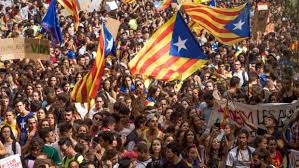Catalan referendum: Police locks off polling stations
Spanish
national police have sealed off 1,300 of 2,315 schools in Catalonia designated
as polling stations for the banned independence referendum, the government in
Madrid says.
The move
came as the Spanish authorities stepped up their attempts to stop Sunday's
referendum.
Police have
now occupied the regional government's telecommunications centre.
Catalonia, a
wealthy region of 7.5 million people in north-eastern Spain, has its own
language and culture.
It has a
high degree of autonomy, but is not recognised as a separate nation under the
Spanish constitution.
Tens of
thousands of people are expected to vote in Sunday's ballot, which has been
declared illegal by Spain's Constitutional Court.
The
authorities in Madrid have sent thousands of police to the region to stop it
taking place.
They have
been ordered to clear schools occupied by activists - including parents and
their children who remained in the buildings after the end of lessons on Friday
- aiming to ensure the buildings can be used for voting.
Officers
from the Catalan regional police have been instructed to assist, but also told
not to use force.
A government
source quoted by Reuters news agency said 163 schools had been occupied by
families.
Officers
have have also been seizing items such as ballot papers, while prosecutors have
ordered the closure of websites linked to the vote and the arrest of officials
organising the referendum.
Catalan
leader Carles Puigdemont told Reuters news agency that the referendum would go
ahead.
"Everything
is prepared at the more than 2,000 voting points so they have ballot boxes and
voting slips, and have everything people need to express their opinion,"
he said.
Friday saw
thousands of Catalan separatists hold a final rally in the city of Barcelona.
But in the
town of L'Hospitalet de Llobregat, some 2,000 people opposed to independence
attended a rally called by Ciudadanos, Catalonia's main opposition party.
Friday also
saw a judge order media giant Google to remove an application giving
information about the outlawed referendum.
Pressure for
a vote on self-determination has grown over the past five years but in the 2015
regional election, won by an alliance of pro-independence parties, about 40% of
voters backed parties loyal to Spain.
Spanish
unionists argue Catalonia already enjoys broad autonomy within Spain, along
with other regions like the Basque Country and Galicia.



Comments